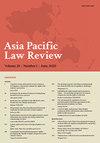The concept of proportionality in public law
IF 1.7
4区 社会学
Q2 LAW
引用次数: 0
Abstract
Proportionality analysis is now well recognized in civil law and common law jurisdictions alike as the approach for determining contentious legal issues arising in the public law field. Two sets of such issues readily spring to mind: the legality of an executive decision and the legality of a restriction of a fundamental right. Franco Chung’s book on the concept of proportionality in public law takes the reader in a tour d’horizon of this topic. Adopted from Chung’s doctoral dissertation, it is a grand tour from the conceptual basis for adopting proportionality to the adaptation and application of proportionality by international, supra-national and national courts, particularly the European Court of Justice (CJEU), the European Court of Human Rights (ECtHR), the United Kingdom and Hong Kong. At the conceptual level, Chung explores in Chapters 1 and 2 of the book the justification for the principle of proportionality in holding executive authorities accountable and the methodology of proportionality analysis, including the associated issues of the margin of appreciation that the CJEU and the ECtHR have developed for supra-national adjudication, and the margin of discretion for executive authorities that the CJEU has inspired into the domestic context. At the practical level, Chung uses the jurisprudence of the CJEU and the ECtHR, discussed in Chapters 5 and 6 respectively, to evaluate, in Chapters 7 and 8 respectively, the extent to which the courts of the United Kingdom and Hong Kong have integrated proportionality analysis into their judicial scrutiny of executive action. This represents a ‘functional comparative approach’ of the extent of such integration in the jurisprudence of two domestic jurisdictions. In between, Chung also tackles two related public law issues. In Chapter 3, Chung critiques the Wednesbury standard of review of an administrative decision. In Chapter 4, Chung challenges the bifurcation, in the enforcement of fundamental rights, between civil and political rights and economic, social and cultural rights, and contends that economic, social and cultural rights are both justiciable and ought to be enforceable on separation of powers grounds. These are important issues that need to be addressed, in line with Chung’s stated approach that executive power and its exercise must be subject to judicial scrutiny on a consistent standard, to conform with the rule of law. These two issues (Wednesbury unreasonableness and the justiciability of economic, social and cultural rights) also impact upon his argument about the applicability of proportionality analysis. Proportionality analysis, according to Chung, offers the ‘more structured and intensive approach’ for the omnibus judicial scrutiny of executive action. Full adoption of proportionality analysis in judicial scrutiny of executive action, including over ‘polycentric socio-economic公法中的比例概念
比例分析现在在大陆法系和英美法系都被公认为确定公法领域中出现的有争议的法律问题的方法。这类问题很容易浮现在脑海中:行政决定的合法性和限制一项基本权利的合法性。弗兰科·钟(Franco Chung)关于公法中比例概念的书将读者带入了这个主题的视野。从采用比例原则的概念基础到国际、超国家和国家法院,特别是欧洲法院(CJEU)、欧洲人权法院(ECtHR)、英国和香港对比例原则的适应和应用,这本书是一个宏大的旅程。在概念层面,Chung在本书的第1章和第2章中探讨了追究行政机关责任的相称性原则的正当性和相称性分析的方法,包括欧洲法院和欧洲人权法院为超国家裁决制定的赞赏幅度的相关问题,以及欧洲法院在国内背景下启发的行政机关自由裁量权的幅度。在实践层面,Chung使用了分别在第5章和第6章中讨论的欧洲高等法院和欧洲人权法院的判例,分别在第7章和第8章中评估了英国和香港法院在多大程度上将比例分析纳入其对行政行为的司法审查。这代表了在两个国内司法管辖区的法理学中这种整合程度的“功能比较方法”。在此期间,郑还处理了两个相关的公法问题。在第三章中,郑议员对行政决定的审查标准进行了批判。在第4章中,郑义宣对基本权利的执行分为公民权利、政治权利和经济、社会、文化权利的情况提出了质疑,主张经济、社会、文化权利都是根据三权分立的原则进行审判和执行的。这些都是需要解决的重要问题,正如郑候选人所说的,行政权力及其行使必须以一致的标准接受司法审查,以符合法治。这两个问题(威斯特伯里的不合理性和经济、社会和文化权利的可诉性)也影响了他关于比例分析的适用性的论证。Chung说,比例分析为行政行为的综合司法审查提供了“更有条理、更深入的方法”。在行政行为的司法审查中充分采用比例分析,包括对“多中心社会经济”的审查
本文章由计算机程序翻译,如有差异,请以英文原文为准。
求助全文
约1分钟内获得全文
求助全文

 求助内容:
求助内容: 应助结果提醒方式:
应助结果提醒方式:


